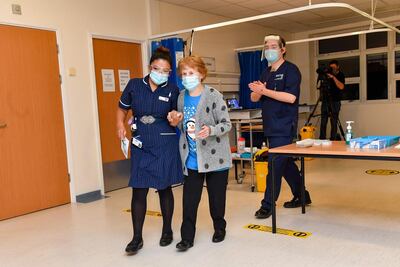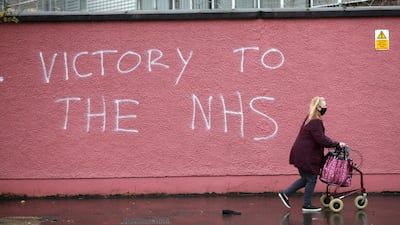A British-Filipino nurse who administered the world's first Pfizer/BioNTech coronavirus vaccine outside clinical trials is known as her hospital's "most prolific jabber".
The shot was delivered to grandmother Margaret Keenan, 90, at University Hospital in Coventry in England on Tuesday at 6.31am.
V-Day – a term coined by Health Secretary Matt Hancock – was the beginning of the biggest inoculation programme in the country's history.
The UK was the first country in the world to approve the 95 per cent effective Pfizer vaccine after the regulator completed rigorous reviews.
Nurse May Parsons said after delivering the shot she was “so proud to contribute to stopping the pandemic”.
“It’s something so positive among all the negative things that have happened this year,” she told Sky News.
“We’re all looking forward to giving our vulnerable patients protection against this devastating virus. As a nurse, that’s really important for me, knowing that they’re going to be safe.”
Ms Parsons has worked for Britain’s National Health Service (NHS) since emigrating from the Philippines 17 years ago. She was selected last week to issue the vaccine and is known as the hospital’s “most prolific jabber”, having already delivered hundreds of flu shots this year.
The nurse of 20 years said she felt no nerves despite vaccinating Ms Keenan in front of the world’s media. “The shakes and the nerves came afterwards,” she said.
Ms Parsons paid tribute to Britain's Filipino nursing community, a group she said was making a “positive contribution to humanity”. A House of Commons report published in June estimated there were more than 22,000 Filipino nurses working for the NHS – the second-largest ethnic group in the health service behind India.
The UK actively encouraged Filipino nurses to make the move to British hospitals through various campaigns aimed at filling staffing shortages. Recently, there was concern a disproportionate number of healthcare workers of Filipino heritage were dying from coronavirus.
Ms Parsons told ITV's Good Morning Britain: "I am really glad to be telling all the Filipinos, in this country and everywhere in the world, we can make a difference and we do offer positive contributions to humanity. I think it is a historical event for the Philippines around the globe, for making sure that we are proud of what we have achieved, and what we contribute to everyone and the care we give."
Teddy Loscin Jr, the Philippines' secretary of foreign affairs, said in a tweet that his country was “so proud” of Ms Parsons.
'I feel so privileged'
Ms Keenan was full of praise for Ms Parsons after receiving her shot.
She said: "I feel so privileged to be the first person vaccinated against Covid-19, it's the best early birthday present I could wish for because it means I can finally look forward to spending time with my family and friends in the new year after being on my own for most of the year.
"I can't thank May and the NHS staff enough who have looked after me tremendously, and my advice to anyone offered the vaccine is to take it – if I can have it at 90 then you can have it too."
The second person to receive the vaccine was William Shakespeare, from Warwickshire in England.
The 81-year-old also had the injection at University Hospital Coventry, 20 miles from Stratford-Upon-Avon, the birthplace of his namesake, England's greatest dramatist and poet.
Health Secretary Matt Hancock appeared to tear up during a live interview when told Mr Shakespeare received the vaccine.
"It's been such a tough year for so many people and there's William Shakespeare putting it so simply for everybody," he told ITV.
"I've still got this worry, we can't blow it now ... but there's so much work that's gone into this, it makes you proud to be British."
Prime Minister Boris Johnson paid tribute to NHS staff, the scientists behind the vaccine and all the volunteers involved in trials.
"We will beat this together," he wrote on Twitter, before visiting St Thomas' Hospital in London to witness a vaccination.
UK Vaccine Taskforce chairwoman Kate Bingham said securing vaccines was a "daunting challenge".
She told BBC Radio 4's Today programme: "If you think about what we knew about Covid-19 in May, we knew very little.
"We knew no vaccine had been developed against any human coronavirus, so it was a daunting challenge."
Britain has ordered more than 350 million vaccine doses from seven different developers.
About 100 million of those doses are to be supplied by Oxford University/AstraZeneca, whose shot is yet to be approved.
First in line to receive the initial batch of 800,000 doses are people aged 80 and over, care-home workers and frontline NHS staff, who are considered at higher risk.
The government also wants to prioritise elderly residents in care homes but is running into technical challenges administering doses away from hospitals, given the need for ultra-low storage temperatures.
Medical staff will contact people to arrange appointments, and most will have to wait until next year before there is enough vaccine to expand the scheme.
NHS England chief Simon Stevens said: "There’s every chance that we will look back on ... [Tuesday] as marking a decisive turning point in the battle against coronavirus."
The vaccine can not arrive soon enough for the UK, which has recorded more than 61,000 Covid-related deaths – more than any other country in Europe.
The 800,000 doses are only a fraction of what is needed. The government is targeting more than 25 million people, or about 40 per cent of the population, in the first phase of its vaccination programme, which gives first priority to those at highest risk from the disease.
After those over 80 and nursing home workers, the scheme will be expanded as supply increases, with the vaccine offered on the basis of age, starting with the oldest people.
In England, the vaccine will be available at 50 hospitals, with more expected to offer it as the rollout expands. Northern Ireland, Scotland and Wales are making their own plans under the UK’s system of devolution.
Logistical issues are slowing the distribution of the Pfizer vaccine because it has to be stored at minus 70°C.
Meanwhile, a World Health Organisation official said that only public health measures, not vaccines, would prevent a third wave of the virus.
"Vaccines are a great tool, they will be very helpful, but the effect of the vaccine in providing some kind of immune barrier is still far off," Dr Margaret Harris said.
"The things that must be done to prevent an increase, an uptick, a surge, or whatever you want to call it, are the public health measures."














